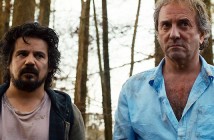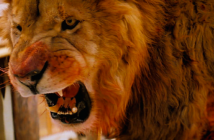
Cast: Leonardo DiCaprio, Matthew McConaughey, Jonah Hill
Director: Martin Scorsese
Country: USA
Genre: Biography | Comedy | Crime | Drama
Official Site: Here
Editor’s Notes: The Wolf of Wall Street opens wide Christmas Day, December 25th.
“Greed is good,” someone somewhere once said. I can’t remember who. By the time you’re done watching The Wolf of Wall Street, you won’t remember either. Because greed is awful. Just awful.
But oh is it tempting. Temptation really is the theme of this movie, the latest from Martin Scorsese, one of the last American masters still in the business. Working with one of the finest casts he’s ever assembled, from a merciless true-story screenplay by Boardwalk Empire boss Terence Winter, Scorsese draws you into a world of bacchanalian excess and grotesquery, and invites you to excuse all the illegal activity that funds it because… well… damn it looks fun!
Scorsese draws you into a world of bacchanalian excess and grotesquery, and invites you to excuse all the illegal activity that funds it because… well… damn it looks fun!
New York up-and-coming stockbroker Jordan Belfort (Leonardo DiCaprio) has barely dipped his toes on the floor of the market when the biggest crash in a lifetime, 1987’s Black Monday, hits, and “shits him back out” onto the streets. Desperate for work he takes a gig on Long Island, selling ‘penny stocks’, tiny shares in go-nowhere companies, but where his cut is 50%. There’s good money to be made for a man who can sell anyone anything.
It’s not long before Belfort’s set up his own firm, and finds a way of shifting penny stocks to real high-fliers – three quick edits and he’s back on Wall Street. If only he didn’t illegally own so much stock in the companies he’s handling…

Wolf of Wall Street is surprisingly unconcerned with how the markets really work, only with how that much money and risk destroys a man; much like Goodfellas was more concerned with the vices of the characters than the structure of the mob, whereas Casino was maybe a little too concerned with explaining how Vegas works. (As an aside, these three films combine to make quite an epic trilogy of criminality in the USA – the similarities are startling, but they compliment each other in ways that critics and academics will enjoy discovering for years to come). The focus of this film becomes Belfort’s addictions; coke, sex and, most terrifyingly, Quaaludes.
We see up close the effect these addictions have on Belfort and his cabal, from raucous office sex parties to $2 million bachelor parties. Sometimes his narration will mention the awful repercussions of these events, but Belfort skips quickly past these things; he doesn’t wanna spoil his fun. He doesn’t wanna break the illusion for us.
Like many of his films before, Scorsese takes us deep into his antihero’s personal life, revealing the grief caused to and by Belfort’s wives (Cristin Milioti and Margot Robbie). But the real drama comes from his relationships with his closest confidants and fellow swindlers: Jonah Hill, Jon Bernthal and P.J. Byrne.
Like many of his films before, Scorsese takes us deep into his antihero’s personal life, revealing the grief caused to and by Belfort’s wives (Cristin Milioti and Margot Robbie). But the real drama comes from his relationships with his closest confidants and fellow swindlers: Jonah Hill, Jon Bernthal and P.J. Byrne. Watching their drug-fuelled ramblings as the actors bounce improvised shtick off one another is when Wolf is at its best – the film is with little doubt the most laugh-out-loud hilarious film Scorsese has made.
But it’s not the best film Scorsese has made. Perhaps it’s his advancing years, or perhaps the grey walls and lined blinds of the stockbrokers office failed to inspire light the bright lights of Casino, but Wolf does not have the visual punch we come to associate with Scorsese’s greatest work. Brokeback Mountain cinematographer Rodrigo Prieto does great work keeping the film looking slick, but it’s still lacking something. When Prieto’s camera sails across the office floor as if on a jet-propelled string, it captures just the right sensation and takes in the faces of the key players spread throughout the room, but it feels like a basic tool in a way the steadicam shot through the nightclub in Goodfellas felt like an instrument of the gods.
Wolf is the first time Scorsese’s direction has ever been overshadowed by cast and script. That’s not to say it’s poorly directed; any filmmaker should be proud to have a film of this calibre under their belts. But it’s still a noticeable shift. But then, what a cast! What a screenplay!

DiCaprio has never truly been better than he is here, finding a balance of humour, pathos, ultra-confidence and shysterism that he struggled to locate in the likes of Howard Hughes or Jay Gatsby. He seizes the film with all the relish he can muster and never lets go. When he’s selling, you’re buying. When he’s raging, you feel his anger. When he overdoses on Quaaludes and loses all motor-control of his body, you witness one of the finest slapstick performances since the movies learned to talk. But the success of the film is in how DiCaprio refuses to chew the film up, leaving more than enough for his co-stars (and indeed Winter has written the supporting roles so well that they have a fighting chance of holding screentime with a character as dominating as Belfort).
Jonah Hill startles as Belfort’s No.2, Donnie, a sexually confused, financially overwhelmed, drug-addled teddy bear. Rob Reiner plays Belfort’s dad, ‘Mad’ Max, brought into the company as a voice of reason and to police the rampant excesses of staff (during office hours). Jean Dujardin plays a Swiss banker so corrupt and smarmy he is briefly able to take over Belfort’s narration, leading to a telepathic battle of wordplay between the pair. Matthew McConaughey radiates glorious immorality in an early cameo. Kyle Chandler, the come-back-prince of 2012, has a one-on-one with DiCaprio that proves to be perhaps the film’s most riveting scene – the characters are so superbly drawn and performances so balanced that a TV actor like Chandler can spar with a superstar like DiCaprio and have everyone look at their best.
Winter, adapting from Belfort’s memoirs (with apparently very little indulgence), is the real star here. It’s his words that suck you in, his callbacks through dialogue and set-ups that keep the film rewarding across its three-hour run-time. Nasty turns of phrase such as cold-callers dubbing themselves “telephone terrorists” make this world seem as sordid and hateful as it is hilarious and tantalising.
Alleged rushing in the editing room does reveal itself with traces of odd cuts here or there, while the film struggles at times to make it clear exactly how much time has passed between scenes. The music, some of it poorly chosen, does little to help this. There’s indulgence on display when a television screen showing an ’80s TV series reveals an early role for actor Steve Buscemi – the camera insists on lingering until you’ve got the joke. He’s worked with these guys, doncha know?
But you can forgive it these trespasses; you can almost forgive Jordan Belfort by the end of it all. But can you forgive yourself for getting so sucked up and entertained by his world? That’s the question being posed here, and Scorsese, fuelled by the energy of a tremendous script and enviable cast on top form, once more leaves us pondering if we could do all these terrible just so we wouldn’t have to go through this world as a regular schmuck.
[notification type=”star”]89/100 ~ GREAT. Sublimely paced, frantic, often hilarious and casually immoral, The Wolf of Wall Street is a constant surprise, mostly because of its caustic dialogue and unpredictable performances. Scorsese’s flair for the visual is sadly lacking for the most part, but he conducts his cast like a young master[/notification]



